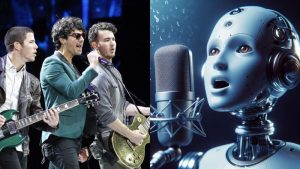Introduction The music industry is no stranger to technological advancements. From the invention of the phonograph to the rise of digital streaming, each innovation has brought about significant changes. The latest development making waves is AI-Generated Music. This article delves into the rise of AI-generated music and its multifaceted impacts on the music industry. What
Introduction
The music industry is no stranger to technological advancements. From the invention of the phonograph to the rise of digital streaming, each innovation has brought about significant changes. The latest development making waves is AI-Generated Music. This article delves into the rise of AI-generated music and its multifaceted impacts on the music industry.
What is AI-Generated Music?

Image by: Google.com
AI-generated music refers to compositions created by artificial intelligence systems. These systems use algorithms and machine learning techniques to analyze vast amounts of musical data, learning patterns and structures that they then use to generate new music. AI-generated music can range from simple melodies to complex symphonies, and it is increasingly being used in various contexts, from background scores in films to commercial jingles.
Historical Context
- Early Experiments: The concept of using machines to create music is not entirely new. Early experiments date back to the 1950s when computer scientists like Alan Turing and Max Mathews began exploring the possibilities of computer-generated music. However, these early attempts were rudimentary and lacked the sophistication of modern AI systems.
- Recent Advances: The advent of machine learning and neural networks has revolutionized AI-generated music. Companies like OpenAI, Google, and Sony have developed advanced algorithms capable of producing music that closely mimics human compositions. OpenAI’s Muse Net and Google’s Magenta are prime examples of how far the technology has come.
How AI-Generated Music Works
- Data Collection: The first step in creating AI-generated music is data collection. This involves gathering a large dataset of musical compositions, which the AI system will analyze to learn patterns and structures.
- Machine Learning: Once the data is collected, machine learning algorithms are used to analyze it. These algorithms identify patterns, such as chord progressions, rhythms, and melodies, which are then used to generate new music.
- Composition: After learning from the data, the AI system can start composing music. This can be done in various ways, such as generating a complete piece from scratch or adding elements to an existing composition.
Applications of AI-Generated Music

Image by: Google.com
- Commercial Use: AI-generated music is increasingly being used in commercials, video games, and films. Its ability to produce high-quality music quickly and cost-effectively makes it an attractive option for businesses.
- Personal Use: AI-generated music is also gaining popularity among individual users. Apps and platforms like Juke deck and Amper Music allow users to create their own music without any musical training.
- Healthcare: In the healthcare sector, AI-generated music is being explored for therapeutic purposes. Studies have shown that music can have a positive impact on mental health, and AI-generated music can be customized to suit individual needs.
Impacts on the Music Industry

Image by: Google.com
- Economic Impacts
- Cost Reduction: One of the most significant economic impacts of AI-generated music is cost reduction. Traditional music production involves hiring composers, musicians, and sound engineers, which can be expensive. AI-generated music eliminates the need for these roles, significantly reducing costs.
- New Revenue Streams: AI-generated music also opens up new revenue streams. For instance, companies can license AI-generated music for commercial use, creating a new source of income.
- Creative Impacts
- Democratization of Music Creation: AI-generated music democratizes music creation, allowing anyone to create music regardless of their musical background. This could lead to an explosion of new music and new genres.
- Collaboration Between Humans and AI: Rather than replacing human musicians, AI-generated music can act as a tool for collaboration. Musicians can use AI to enhance their compositions, creating a new form of art that combines human creativity with machine precision.
- Ethical and Legal Impacts
- Copyright Issues: One of the most contentious issues surrounding AI-generated music is copyright. Traditional copyright laws are based on the assumption that music is created by humans. The rise of AI-generated music challenges this notion, raising questions about who owns the rights to AI-generated compositions.
- Job Displacement: While AI-generated music offers numerous benefits, it also poses the risk of job displacement. Musicians, composers, and sound engineers may find themselves out of work as AI systems become more prevalent.
Future Prospects
- Technological Advancements: As technology continues to evolve, AI-generated music is likely to become even more sophisticated. Future advancements could enable AI to produce music that is indistinguishable from human compositions.
- Integration with Other Technologies: AI-generated music could also be integrated with other emerging technologies, such as virtual reality and augmented reality, creating new and immersive musical experiences.
Conclusion
The rise of AI-generated music is a testament to the rapid advancements in artificial intelligence and machine learning. While it offers numerous benefits, it also poses significant challenges that need to be addressed. As the technology continues to evolve, it will be fascinating to see how the music industry adapts to this new paradigm. Whether it leads to the democratization of music creation or the displacement of traditional roles, one thing is certain: AI-generated music is here to stay.
This article provides an informative overview of the rise of AI-generated music and its impacts on the industry. While the technology offers numerous benefits, it also poses significant challenges that need to be addressed. As the technology continues to evolve, it will be fascinating to see how the music industry adapts to this new paradigm.
















